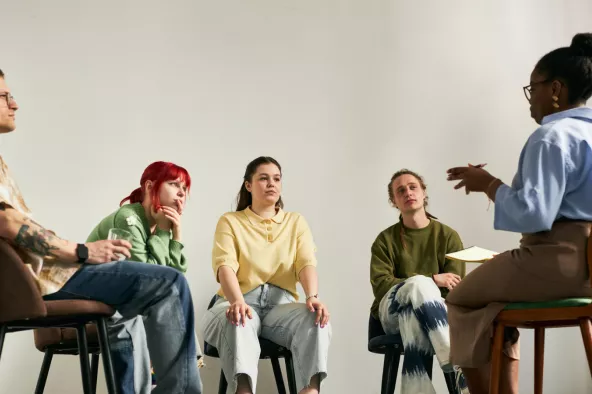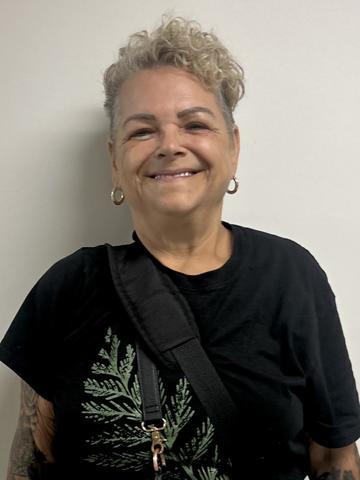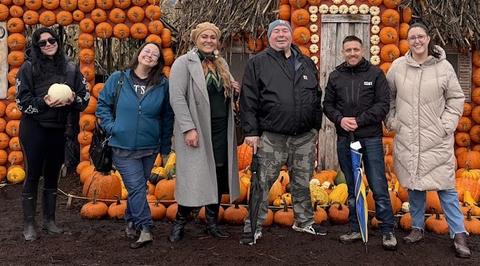Lived experience driving two new Health Canada-funded projects at BCMHSUS

Funded by Health Canada’s Substance Use and Addictions Program, the Recovery College and Peer Support Worker projects received a combined $2.9 million over 3.5 years.
“These two projects illustrate our commitment to co-create programs and services with people with lived and living experience,” says Jennifer Duff, chief operating officer, BCMHSUS. “Only a small percentage of applications were funded, so the fact we received two grants speaks to quality and potential impact of these initiatives.”
Tailoring a recovery college for a new community
BCMHSUS is piloting the concept of a recovery college for the first time with people with concurrent disorders and involvement in the correctional system. Recovery colleges are peer-led education initiatives that offer courses and groups to support people in recovery. They are commonly used community mental health.

“We want the Recovery College to complement existing programs and help people sustain their (personal) recovery,” says Pamela Young, peer coordinator and a person with lived experience (pictured at right).
While clinical recovery is focused on the remission of symptoms, personal recovery is defined by each person.
“We want to create a safe, inclusive learning environment that will help people take charge of their care when they transition to community,” Pamela continues. “We recognize that structural barriers in our systems often fail to adequately support individuals during this critical period."
The Recovery College steering committee includes strategic advisors with lived and living experience. All courses offered by the college will be developed and facilitated by people with lived and living experience (PWLLE).
To date, the steering committee and project team have chosen the Heartwood Centre for Women and Hawthorne Unit at Forensic Psychiatric Hospital as pilot sites. Ultimately, they want to scale up Recovery College to all BCMHSUS services, including regional clinics. They are also learning how to create programming that is culturally safe, anti-racist, and that accounts for different learning styles and cognitive abilities. Pamela is co-developing peer facilitator training to enable PWLLE to offer courses in the Recovery College.
Clients have been asked what kind of courses they’d like to see. The list is varied; everything from accessing community services, career development, and navigating the internet to arts-based programs, land connection and spirituality. Courses will be offered in person at Heartwood Centre and Hawthorne Unit starting next spring.
“Over time, we want to develop an online platform so that people can continue to take courses once they’re back in community,” says Pamela. “We know that transition to community is challenging for many clients and we want to give them additional tools in their recovery toolkit.”
Launching Peer Support Workers at Red Fish and Heartwood
While peer support workers (PSWs) are common in many recovery programs, they didn’t exist in quaternary level mental health and substance use facilities like the Red Fish Centre and Heartwood Centre for Women. That changed earlier this year when BCMHSUS used the Health Canada funding to hire five peer support workers and one peer coordinator. The peer support workers really understand what it is like to be in recovery and can provide a unique type of support to clients.

“A typical day for me involves walking around the Centre, saying hi to clients and connecting with them. I try to chat to at least 10 clients a day,” says Rick Lafond, a peer support worker at Red Fish Centre (pictured in group photo at left). “I also run groups during the week and step in to help clients however I can. I help clients fill out government forms and other documents, or I go with them to outside appointments. Sometimes we just go for coffee and talk.”
The PSWs participate in all case conferences, answer questions from the clinical team and advocate for client needs. Because of their lived experience, they can help new clients navigate the “us and them” mentality that can exist between clients and clinical staff.
Early feedback has been very positive. The clinical staff appreciate that PSWs connect with clients in a different way. And clients appreciate having someone at the facility who can understand what they are going through and help them navigate their recovery journey. In the words of one client, “When I’m sad, they give me someone to talk to, people outside the clinicians. They provide a refreshing ear, because they’ve been through similar things.”
Both projects include an evaluation component to grow the evidence base for a community-rooted recovery approach within clinical environments. This will inform future funding decisions, while also building an evidence base for how these models can augment conventional care structures.